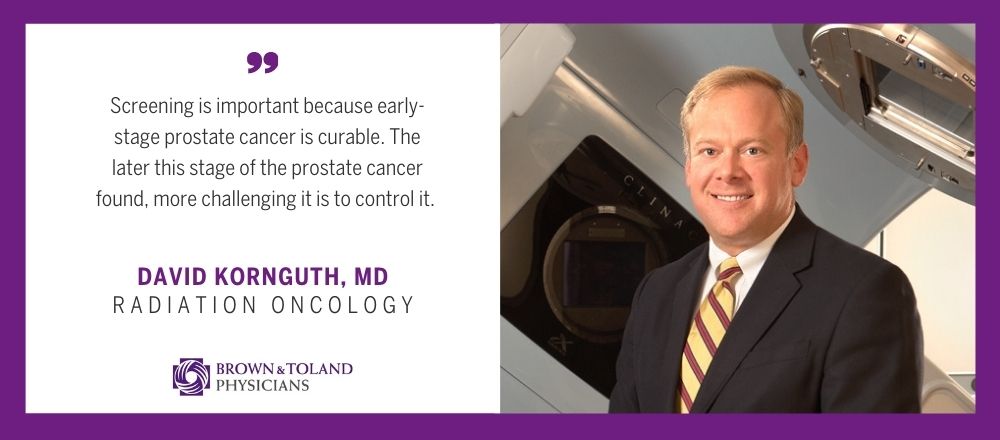Prostate Cancer 101: What Men Need to Know

Prostate cancer is the most common type of cancer found in American men, after skin cancer. If you or a loved one is diagnosed with prostate cancer, one of the first things you can do is educate yourself about the disease and available treatment options.
We recently sat down with David Kornguth, MD, and Mikhail Regelman, MD, of Golden Gate Urology, to discuss what to know about a cancer that will affect one in eight American men in their lifetimes.
Q: Let’s start with the basics. What is the prostate?
Dr. Kornguth: In short, the prostate is a reproductive organ in men located just below the bladder. Its function is to produce seminal fluid or the ejaculate.
Q: What causes prostate cancer?
Dr. Regelman: All cancers are caused by damage to the genetic information, or DNA, of a cell. Sometimes that damage causes the cells to grow more rapidly than normal cells of the same organ. This rapid, uncontrolled growth of the cells is what causes cancer.
Dr. Kornguth: Yes, and normal cells and normal DNA ensure that cells can only grow in their site of origin. Cells in the prostate that are damaged can ultimately lose their specificity for growing only in the prostate itself and can then spread to other parts of the body through the bloodstream.
Q: Is prostate cancer considered to be an aggressive form of cancer?
Dr. Kornguth: When we say aggressive, we mean its capability of spreading to other sites. In most men, prostate cancer is diagnosed at an early stage, before it has developed the capability to spread.
Dr. Regelman: And while most forms of prostate cancer tend to not be aggressive, there is a subset of prostate cancer that can spread to other areas, such as the bones or lymph nodes.
Q: How treatable is prostate cancer?
Dr. Kornguth: All prostate cancers are treatable. Sometimes treatment may involve treating just the prostate. Sometimes areas outside the prostate have to be treated. It all depends on the extent of disease or the so-called stage.
Dr. Regelman: Even when prostate cancer is found in later stages, once it has started to spread to other organs it is still very treatable although not curable. There has been a lot of developments recently for the treatment of metastatic prostate cancer (cancer that has already spread to other organs) and with these newer treatments, life expectancy can be extended to 5-10 years from time of diagnosis.
Q: Do some men have a higher risk of getting prostate cancer?
Dr. Kornguth: There are many who are born with mutations that make development of prostate cancer more likely. Even in these men, it usually affects their risk of developing prostate cancer in their 50s or 60s. Some of the mutations have been identified, other families have high risks of prostate cancer without any identifiable mutation found.
Dr. Regelman: Yes, and in addition to genetic mutations, there are other factors that increase risk, most notably age. Others are recurring inflammation or infection of the prostate, obesity and race. African Americans, for example, have a much higher incidence of prostate cancer than non-African Americans.
Q: Are screenings important in detecting prostate cancer early?
Dr. Kornguth: Screening is important because early-stage prostate cancer is curable. The later the prostate cancer is found, the more challenging it is to control it. Screening usually consists of a physical exam and a blood test that includes the prostate-specific antigen, or PSA, test. Even though the PSA is not a perfect test, it is far more accurate than most other blood tests used for other cancers.
Dr. Regelman: It’s important to note that the current screening protocol only requires a PSA test once each year. A prostate exam – the reason many men declined the screening in the past — is only required if the PSA is in an abnormal range.
Q: When should men start getting screened?
Dr. Regelman: Like with any other cancer, screening should be limited to men who are at higher than average risk for prostate cancer. For men without familial history, screening should start at age 50 for African American men and at age 55 for non-African American men. African American man with a family history of prostate cancer should get his first PSA test at age 45. When and how often to screen begins with a discussion with your doctor.
Q: What are the treatment options for men with prostate cancer?
Dr. Kornguth: Treatment for prostate cancer includes surgically removing the prostate (prostatectomy) together with external radiation or internal radiation (brachytherapy). Sometimes hormone therapy (drugs that lower testosterone) is also used in addition to these procedures.
Dr. Regelman: And some low-grade prostate cancers can be actively monitored, meaning they do not need to have any interventions at all, just observation. Observation includes regular PSA blood tests, physical exams, regular prostate biopsies.
For those who do require surgery, the procedure is most commonly done through a minimally invasive robotic system, which means less pain and a shorter hospital stay. The precision of this method can also mean fewer complications like decreased sexual function and incontinence.
Q: How does prostate cancer treatment affect sexual function?
Dr. Kornguth: Sexual side effects are very common in men who undergo treatment for prostate cancer. For example, as I mentioned earlier, the job of the prostate is to make seminal fluid. So, at minimum, dry ejaculate is expected after prostate cancer treatment.
Dr. Regelman: While the loss of the prostate results in the lack of ejaculation, the ability to reach climax or orgasm is still preserved. Surgical and radiation treatment also affect the ability to achieve an erection. With surgical removal, the ability to achieve an erection usually returns, though most of the time it does require the use of medications.
Q: What about urination?
Dr. Kornguth: Depending on the treatment option, urinary function can be affected by prostate cancer treatment. Radiation can result in several issues, including slower urinary streams and waking at night to urinate. Surgery can also lead to some urinary leakage issues, or incontinence, particularly for patients who have weak pelvic floor muscles.
Dr. Regelman: When the prostate is removed, one of the sphincters (muscles that hold urine back) is also removed, leaving only the pelvic floor muscles to keep the urine back. It can take a little time and practice to learn how to use and strengthen the pelvic floor muscles to regain continence. Men who are younger and thinner tend to recover their continence sooner than men who are older or overweight. However, a year after surgery, 95 percent of men are fully continent.
Q: What is the long-term follow-up like for men who have been treated for prostate cancer?
Dr. Regelman: After treatment, patients are typically monitored for 10 years with PSA blood tests, at first every three months and then once per year. After surgery, most patients’ PSA level falls to undetectable levels in the blood.
If the PSA starts to be detectable again, it is usually a sign that cancer has returned. Fortunately, in the last 10 years, there has been a lot of development to treat prostate cancer that has returned after treatment. There are new drugs that can take advantage of your own immune system or endocrine system to fight the cancer and are greatly extending patients’ lives.
Specializing in the diagnosis and treatment of prostate cancer, radiation oncologist Dr. David Kornguth and urologist Dr. Mikhail Regelman practice at Golden Gate Urology in San Francisco, Oakland and Berkeley.


MEDICAL DISCLAIMER: The content of this Website or Blog is not intended to be a substitute for professional medical advice, diagnosis, or treatment. Always seek the advice of your physician or other qualified health provider with any questions you may have regarding a medical condition. Never disregard professional medical advice or delay in seeking it because of something you have read on this Website or Blog.
If you think you may have a medical emergency, call 911 immediately, call your doctor, or go to the emergency room/urgent care.
